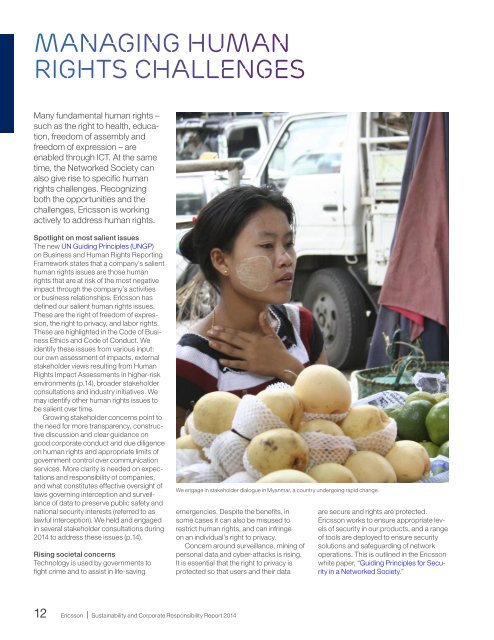OkCBP
OkCBP
OkCBP
Create successful ePaper yourself
Turn your PDF publications into a flip-book with our unique Google optimized e-Paper software.
Managing human<br />
rights challenges<br />
Many fundamental human rights –<br />
such as the right to health, education,<br />
freedom of assembly and<br />
freedom of expression – are<br />
enabled through ICT. At the same<br />
time, the Networked Society can<br />
also give rise to specific human<br />
rights challenges. Recognizing<br />
both the opportunities and the<br />
challenges, Ericsson is working<br />
actively to address human rights.<br />
Spotlight on most salient issues<br />
The new UN Guiding Principles (UNGP)<br />
on Business and Human Rights Reporting<br />
Framework states that a company’s salient<br />
human rights issues are those human<br />
rights that are at risk of the most negative<br />
impact through the company’s activities<br />
or business relationships. Ericsson has<br />
defined our salient human rights issues.<br />
These are the right of freedom of expression,<br />
the right to privacy, and labor rights.<br />
These are highlighted in the Code of Business<br />
Ethics and Code of Conduct. We<br />
identify these issues from various input:<br />
our own assessment of impacts, external<br />
stakeholder views resulting from Human<br />
Rights Impact Assessments in higher-risk<br />
environments (p.14), broader stakeholder<br />
consultations and industry initiatives. We<br />
may identify other human rights issues to<br />
be salient over time.<br />
Growing stakeholder concerns point to<br />
the need for more transparency, constructive<br />
discussion and clear guidance on<br />
good corporate conduct and due diligence<br />
on human rights and appropriate limits of<br />
government control over communication<br />
services. More clarity is needed on expectations<br />
and responsibility of companies,<br />
and what constitutes effective oversight of<br />
laws governing interception and surveillance<br />
of data to preserve public safety and<br />
national security interests (referred to as<br />
lawful interception). We held and engaged<br />
in several stakeholder consultations during<br />
2014 to address these issues (p.14).<br />
Rising societal concerns<br />
Technology is used by governments to<br />
fight crime and to assist in life-saving<br />
We engage in stakeholder dialogue in Myanmar, a country undergoing rapid change.<br />
emergencies. Despite the benefits, in<br />
some cases it can also be misused to<br />
restrict human rights, and can infringe<br />
on an individual’s right to privacy.<br />
Concern around surveillance, mining of<br />
personal data and cyber-attacks is rising.<br />
It is essential that the right to privacy is<br />
protected so that users and their data<br />
are secure and rights are protected.<br />
Ericsson works to ensure appropriate levels<br />
of security in our products, and a range<br />
of tools are deployed to ensure security<br />
solutions and safeguarding of network<br />
operations. This is outlined in the Ericsson<br />
white paper, “Guiding Principles for Security<br />
in a Networked Society.”<br />
12 Ericsson | Sustainability and Corporate Responsibility Report 2014


